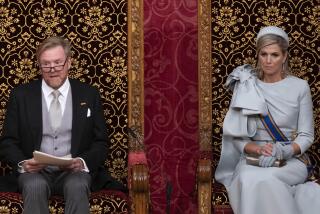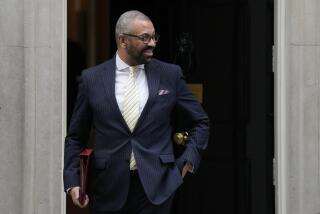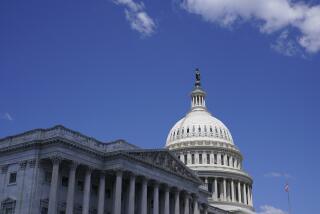National ID Cards Among Blair’s Proposals as Parliament Reopens
- Share via
LONDON — Prime Minister Tony Blair unveiled a controversial measure for a national identity card embedded with the bearer’s biological data, one of 45 laws proposed as the British Parliament reopened Tuesday after the hotly contested election earlier this month.
Returned to power for a third term, but with a severely reduced majority, Blair’s Labor Party government presented its program in a speech that was read amid traditional pomp by Queen Elizabeth II in her role as head of state.
The prime minister, who has ruled out leading his party into another election, has said he wants his government to continue its ambitious social reforms while fostering a “culture of respect” for law and responsibility among the British people.
With the belief widespread that rude behavior is on the upswing in British cities, Blair told Parliament later during debate on the speech: “It is time to reclaim the streets for the decent majority.”
He stressed domestic issues such as education, social services and security and immigration and, on the foreign front, the European constitution, the war on terrorism and global climate change.
The ceremony saw the queen, in regal white gown and imperial crown, and the duke of Edinburgh, resplendent in a gold-braided naval uniform, arrive in a gilded, horse-drawn coach for the ceremonial opening of Parliament. By custom, it is the sole occasion when the monarch is permitted in the legislative building. After the ritual of the royal entrance, the queen’s 11-minute speech set out the agenda for Blair’s third term.
Blair’s hopes of getting all his government’s bills passed depend on whether he can count on full support within his own party, particularly the 30 to 40 Labor members of Parliament who opposed his alliance with the United States in the Iraq war. Many of them have said they would prefer to see him resign before the end of the 18-month parliamentary session in favor of Gordon Brown, the chancellor of the exchequer, or finance minister.
Labor has 354 seats in the 645-member Parliament.
The queen opened the speech by focusing on the Labor Party’s main strength, the economy. She then announced that the government would address “legislation in key areas of public service delivery: education, health, welfare and crime.”
Among the most discussed issues are proposals for ID cards, tightened controls on immigration and asylum seekers, stronger anti-terrorism laws and outlawing “incitement to religious hatred.”
Home Secretary Charles Clarke reintroduced with some changes the proposed identity card bill, defeated in the last Parliament, in an effort to prevent credit card and identity fraud, theft and illegal employment and immigration.
The proposal, which has the support in principle of the opposition Conservative Party, would have each British citizen carry a card with “biometric” data, including fingerprints and personal details that would be stored in a national identity database.
Critics from the Liberal Democratic Party call the bill intrusive. The measure is “contrary to principle, contrary to the constitutional history of this country [and] a momentous change which once made will never be reversed. That is why it should be regarded with the greatest scrutiny,” said Menzies Campbell, a leader of the Liberal Democrats, during a televised debate.
Other proposals included stricter regulations on immigrant workers and asylum seekers, introducing a point system for people seeking to work in Britain and strengthening border controls.
“A man in a hurry,” the Times of London’s Philip Webster said of Blair’s program. But Patrick Dunleavy, a professor at the London School of Economics, saw less in the proposals. “It looks more like tweaking, or hyper-tweaking, of measures we already know about,” he said.
The Middle East remains one of Blair’s key commitments. The speech reiterated hopes for a negotiated settlement between the Israelis and Palestinians and pledged support for Iraq’s transitional government as it writes a constitution and prepares for future elections.
Britain will continue “to assist the government of Afghanistan including in its counter-narcotic efforts, and to support better standards of governance throughout the world,” the queen declared in the speech.
To achieve these objectives, the queen continued, “the government will work to deepen and develop the strong partnership between Europe and the United States.”
On domestic issues, Blair made clear his commitment to tackling street crime and violence as well as lesser offenses such as public drunkenness and intimidation. Laws were promised to give police and communities new powers to restrict the sale of knives and some firearms and rein in violence linked to alcohol.
Some civil liberties groups are concerned about proposals to give local officials broader authority to issue “antisocial behavior” orders, which amount to injunctions against unruly behavior applied outside the criminal justice system.
Together with new anti-terrorism laws and identity cards, such measures threaten to “turn Britain into a very watched society,” Dunleavy said.
More to Read
Sign up for Essential California
The most important California stories and recommendations in your inbox every morning.
You may occasionally receive promotional content from the Los Angeles Times.













